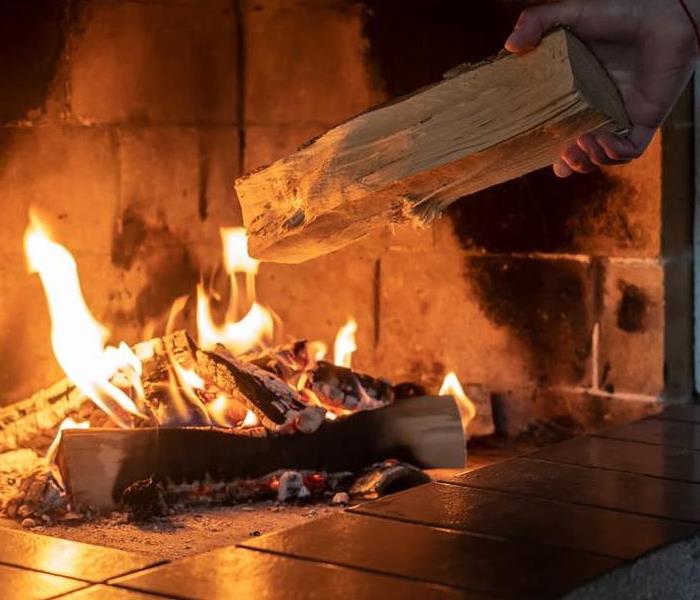Can Fireplaces Cause House Fires?
1/16/2023 (Permalink)
 Fireplaces need a clean chimney to operate well, otherwise you could be in danger of carbon monoxide poisoning.
Fireplaces need a clean chimney to operate well, otherwise you could be in danger of carbon monoxide poisoning.
There's something about the smell of a crackling fire on a chilly autumn evening that makes us feel all warm and toasty. But the idea of a fireplace also raises some red flags. Are fireplaces safe? Can they cause house fires?
The primary hazards associated with using a fireplace in your home have two dangers: sparks and carbon monoxide (CO). Let's take a closer look at safety concerns and how you can protect yourself from potential dangers related to using your fireplace this season.
The Leading Causes of Fireplace-Related House Fires
Chimney fires are the leading cause of fireplace-related house fires in the United States. When a fire burns in a fireplace, it produces a great deal of soot and creosote. This combination of soot and creosote can build up inside the chimney, causing a fire.
Another leading cause of fireplace-related house fires is embers landing on combustible surfaces. When a fire is burning in a fireplace, there are often hot embers that can pop out and land on nearby surfaces. If these surfaces are combustible, they can cause a house fire.
Faulty wiring is also a leading cause of fireplace-related house fires. When a fireplace is not properly wired, it can create a fire hazard. If you have a fireplace, it's important to ensure that it's properly wired and all electrical components are in good working order.
Carbon Monoxide: A Real Fireplace Danger
In addition to the physical dangers of fire, there's also the danger of carbon monoxide poisoning. Fires in fireplaces produce carbon monoxide when they burn. If there's poor ventilation in the room where the fireplace is located, the carbon monoxide can build up to dangerous levels. This is why having a working carbon monoxide detector in your home is important.
If you experience a fire in your fireplace or suspect that there may be high levels of carbon monoxide present, it's important to get out of the house immediately and call for help. Firefighters and other first responders can quickly assess the situation and determine if it's safe for you to return to your home or not.
How to Prevent Fireplace-Related House Fires
While a fireplace can be a wonderful addition to any home, it's important to practice safety to prevent fires. Here are some tips:
- Make sure to have your chimney cleaned regularly. A build-up of soot and debris can be very dangerous.
- Inspect your fireplace regularly. Look for cracks in the firebox or damage to the chimney. These can be dangerous and should be repaired immediately.
- Don't burn trash or paper in your fireplace. This can cause a chimney fire.
- Be careful of where you place embers after you're done using the fireplace. They should be placed in a metal container and fully extinguished before being thrown away.
- If you have an old or poorly-maintained fireplace, consider having it upgraded or replaced.
- Never leave a fire unattended. Always extinguish the flames completely before leaving the house.
What to Do When Fire Strikes
If you have a fire in your fireplace, it's important to immediately prevent the fire from spreading. Here are some tips:
- Extinguish the flames. If possible, use a fire extinguisher to put out the flames. Otherwise, smother the fire with a wet blanket or pot lid.
- Call the fire department. Even if you think you have extinguished the fire, it's important to have a professional assess the situation.
- Evacuate the premises. Get everyone out immediately.
- Ventilate the area. Once the fire is out, open up all the windows and doors in the room to ventilate the area. This will help to clear out any dangerous fumes or smoke.
If you've experienced a fire in your home, don't hesitate to contact SERVPRO of East Baton Rouge and Ascension at (225) 753-3434 for help. Our experienced and certified professionals are available 24/7 to help you with all your fire clean-up and restoration needs.





 24/7 Emergency Service
24/7 Emergency Service